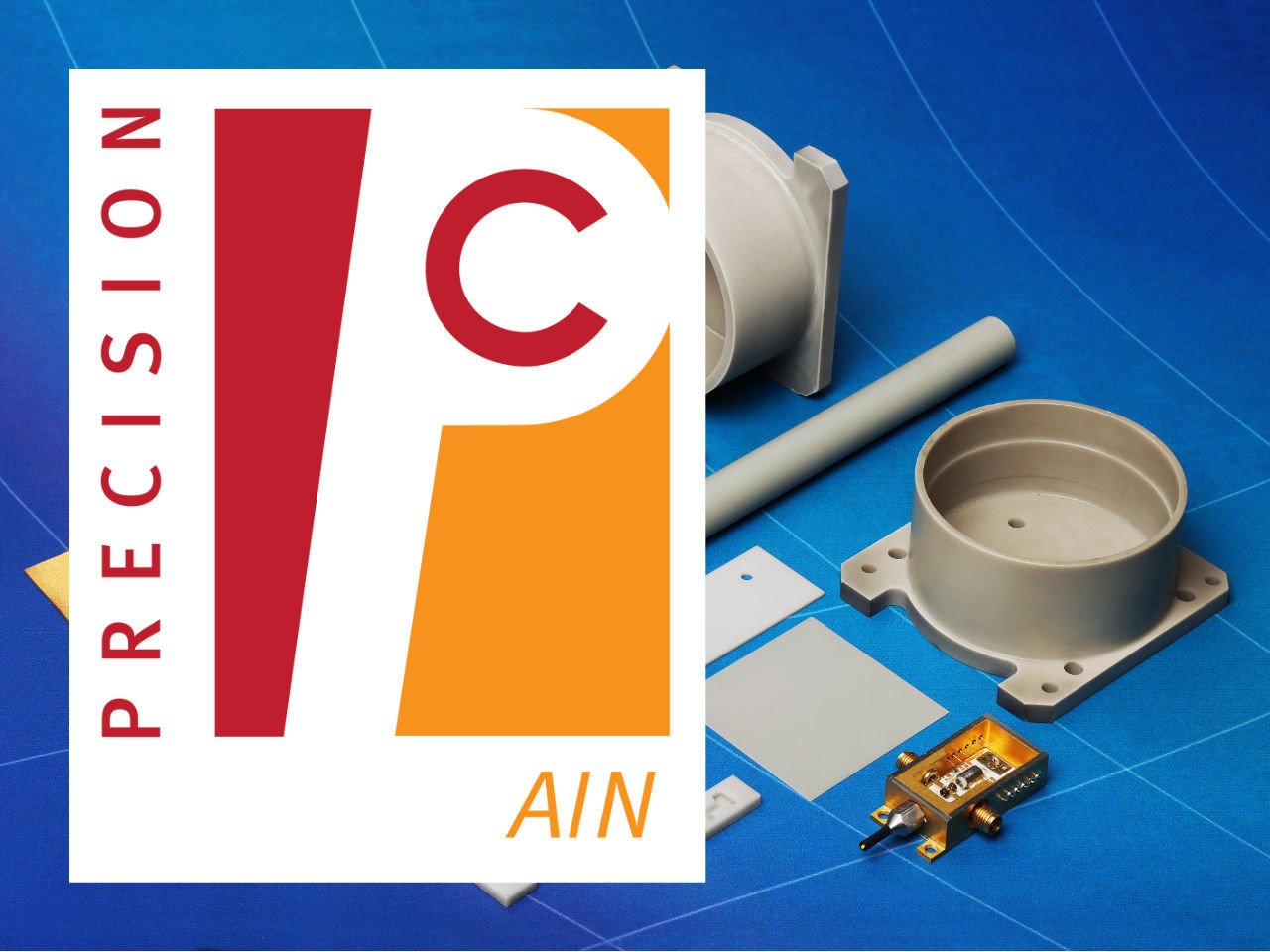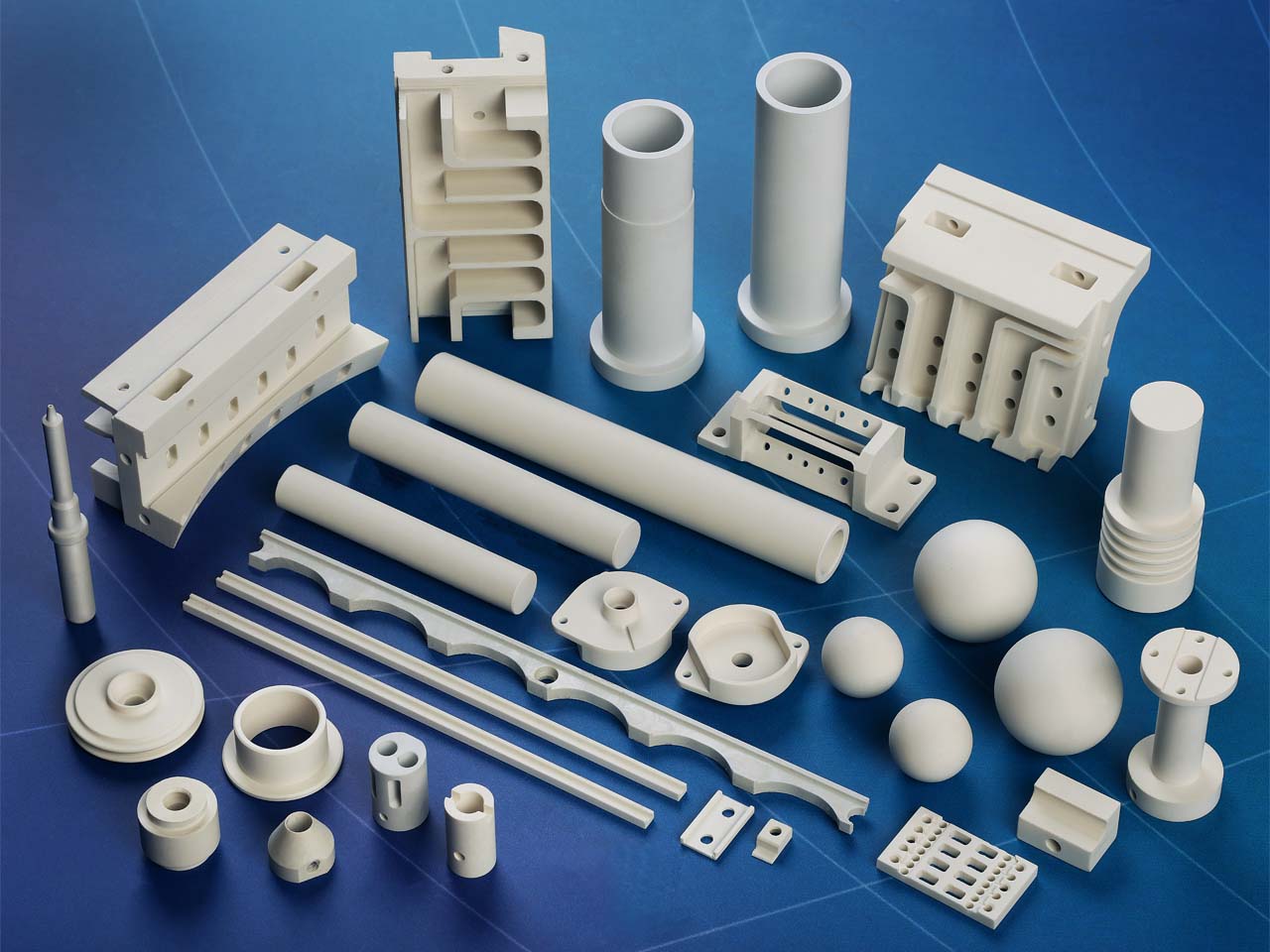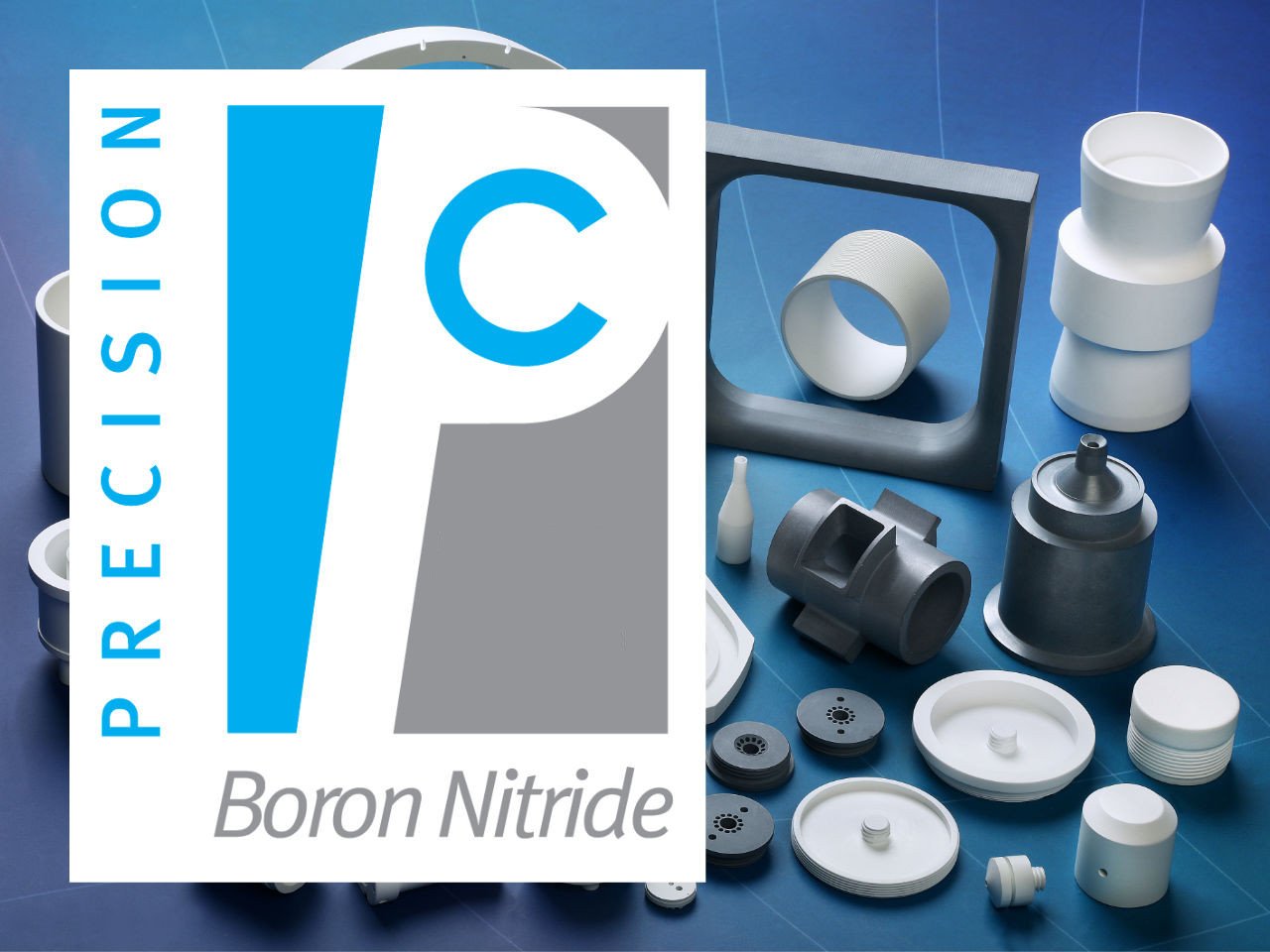Aluminum Nitride – CeramAlumTM
Aluminum Nitride (AlN) is an excellent material to use if high thermal conductivity and electrical insulation properties are required, which makes it an ideal material for use in thermal management and electrical applications. Additionally, AlN is a common alternative to Beryllium Oxide (BeO) in the semiconductor industry as it is not a health hazard when machined. Aluminum Nitride has electrical insulation properties and a coefficient of thermal expansion that closely matches that of Silicon wafer material, making it a useful material for electronics applications where high temperatures and heat dissipation are often a problem.
Material Advantages
- Over five times the thermal conductance of Alumina
- Enables high performing devices to function faster and better in smaller devices
- No toxic issues of beryllia
- Good plasma resistance
- Excellent thermal shock performance
Applications
- High power electrical insulators
- Power electronics
- Heat spreaders
- Passive heat sinks
- Actively cooled heatsinks
- Laser components
- Aerospace, power electronics, rectifiers supplied to ISO9001/2015
Material Grades
Precision Ceramics has multiple variations of Aluminium Nitride. The differing methods used to produce these materials results in slightly different properties and characteristics. We evaluate the similarities, differences, and properties of the materials and their applications in this section.
PCAN1000
Overview
PCAN1000 is our standard high purity aluminium nitride with a thermal conductivity of 170 W/mK. This is the same thermal performance as our substrate material but offers the possibility of larger pieces in length/width and in thicknesses up to 30mm.
PCAN1000 has good coefficient of thermal expansion – matched to silicon and gallium nitride over wide temperature ranges.
Applications
- High power insulators
- Laser components
- Water cooled heatsinks
- Power electronics
- Aerospace, medical and semiconductor components supplied to ISO9001/2015
PCAN2000
Overview
PCAN2000 is one of our enhanced grades of aluminium nitride, offering all the mechanical performance of PCAN1000 with the enhanced benefits of 200 W/mK thermal conductance.
Applications
- Heat sinks
- Heat spreaders
- Laser heatsinks power rectifiers
- Aerospace, power electronics, rectifiers supplied to ISO9001/2015
PCAN3000
Overview
PCAN3000 is one of our enhanced grades of aluminium nitride offering, all the mechanical performance of PCAN1000 with the enhanced benefits of 230 W/mK thermal conductance.
Applications
- Heat sinks
- Heat spreaders
- Laser heatsinks power rectifiers
- Aerospace, power electronics, rectifiers supplied to ISO9001/2015
PCAN4000
Overview
PCAN4000 is one of our enhanced grades of aluminium nitride offering, all the mechanical performance of PCAN1000 with the enhanced benefits of 200 W/mK thermal conductance
Applications
- Heat sinks
- Heat spreaders
- Laser heatsinks power rectifiers
- Aerospace, power electronics, rectifiers supplied to ISO9001/2015
PCAN1000S Substrate
Overview
PCAN1000S 170 W/mK is our standard high thermal conductivity substrate material, However, other high-performance grades are also available.
Applications
- Heat sinks
- Heat spreaders
- Laser heatsinks power rectifiers
- Aerospace, power electronics, rectifiers supplied to ISO9001/2015
Aluminum Nitride Properties
Mechanical Properties
| Property | Unit | PCAN1000 | PCAN2000 | PCAN3000 | PCAN4000 | PCAN1000S |
|---|---|---|---|---|---|---|
| Density | g/cm3 | 3.32 | 3.32 | 3.32 | 3.30 | 3.30 |
| Young’s Modulus | GPa | 300-350 | 300-350 | 300-350 | 300-350 | 350 |
| Fracture Toughness KIC | MPa m1/2 | 3 | 3 | 3 | 2.5 | 3 |
| Poisson’s Ratio | – | 0.22 | 0.22 | 0.22 | 0.22 | 0.22 |
| Compressive Strength | MPa | 3000 | 3000 | 3000 | 3000 | 3000 |
| Flexural Strength @ 25°C | MPa | 350 | 350 | 350 | 350 | 350 |
| Hardness | GPa | 10 | 10 | 10 | 12 | 11 |
Thermal Properties
| Property | Unit | PCAN1000 | PCAN2000 | PCAN3000 | PCAN4000 | PCAN1000S |
|---|---|---|---|---|---|---|
| Thermal Conductivity @ 25°C | W/mK | 170 | 200 | 230 | 200 | 170 |
| * CTE 25°C ➞ 400°C | 10-6/K | 4.5 | 4.5 | 4.5 | 3.5 | 4.6 |
| ** Max Temperature (Air) | °C | 1200 | 1200 | 1200 | 1200 | 1200 |
| ** Max Temperature (Inert) | °C | 1200 | 1200 | 1200 | 1200 | 1200 |
* Coefficient of Thermal Expansion (CTE) describes how the size of an object changes with a change in temperature.
** Note: No Load
Note: AlN can form a surface Aluminum oxide layer. This helps to protect the material, however, it impacts the thermal conductivity (Alumina is ~30 W/mK). In oxidizing atmospheres, this layer develops around 700°C. In inert atmospheres, this layer protects the AlN up to ~1350°C. Bulk oxidation will occur at temperatures above this.
Electrical Properties
| Property | Unit | PCAN1000 | PCAN2000 | PCAN3000 | PCAN4000 | PCAN1000S |
|---|---|---|---|---|---|---|
| Dielectric Constant | 1 MHz | 8.8 | 8.8 | 8.5 | 8.5 | 8.8 |
| Dielectric Loss | 1 MHz | 5×10-4 | 5×10-4 | 5×10-4 | 5×10-4 | 5×10-4 |
| Dielectric Strength DC @ 25°C | kV/mm | 15 | 15 | 15 | 15 | 14 |
| Volume Resistivity @ 25°C | ohm-cm | >1013 | >1013 | >1013 | >1014 | >1014 |
Disclaimer: The values presented are mean and typical of those resulted from test samples. They are provided as an indication only to serve as guidance in the design of ceramic components and are not guaranteed in any way. The actual values can vary according to the shape and size of the envisioned component.
Datasheets
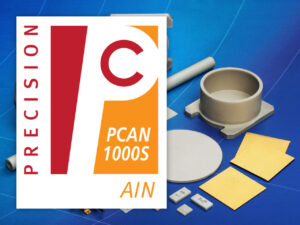
Aluminum Nitride
PCAN1000S Substrate
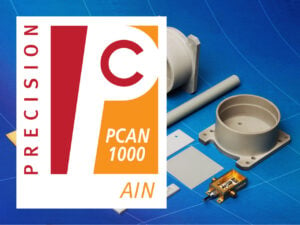
Aluminum Nitride
PCAN1000
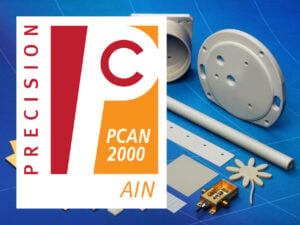
Aluminum Nitride
PCAN2000
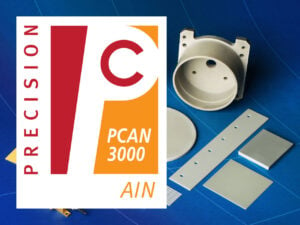
Aluminum Nitride
PCAN3000
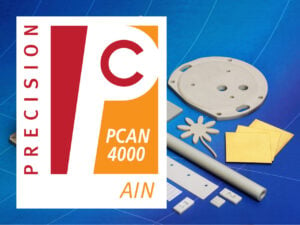
Aluminum Nitride
PCAN4000
Aluminum Nitride Machining
Precision Ceramics is your Aluminum Nitride machining specialist for your technical ceramic prototyping & manufacturing needs. We use our many years of advanced ceramics experience to provide advice on materials, design, and application. If you would like to buy Aluminum Nitride plates, rods, tubes or custom machined components, or need more information, please contact us and one of our experts will be happy to assist you. We can supply components in prototype to production quantities with pressed, isostatic pressed, machined, and ground parts.
Aluminum Nitride can be machined in green, biscuit, or fully dense states. While in the green or biscuit form, it can be machined relatively easily into complex geometries. However, the sintering process that is required to fully densify the material causes the Aluminum Nitride body to shrink approximately 20%. This shrinkage means that it is impossible to hold very tight tolerances when machining AlN pre-sintering.
In order to achieve very tight tolerances, fully sintered material must be machined/ground with diamond tools. In this process a very precise diamond coated tool/wheel is used to abrade away the material until the desired form is created. Due to the inherent toughness and hardness of the material, this can be a time consuming and costly process. Shapal Hi-M Soft is often used as a substitute for pure AlN because it also offers high thermal conductivity, electrical insulation, and can be machined into complex geometries with tight tolerances.
AlN commonly comes in substrates up to 1 mm thick, which can easily be laser cut. It can also come in thicker forms, however, it can be difficult/costly to manufacture in small quantities if the part requires custom material or significant machining. Shapal Hi-M Soft is often used as an alternative to pure aluminum nitride because it also offers high thermal conductivity and can be machined into complex geometries.
Frequently Asked Questions
-
What is Aluminum Nitride?
Aluminum Nitride (AlN) is an excellent material to use if high thermal conductivity and electrical insulation properties are required; making it an ideal material for use in thermal management and electrical applications. Additionally, Aluminum Nitride is common alternative to Beryllium Oxide (BeO) in the semiconductor industry as it is not a health hazard when machined. Aluminum Nitride has a coefficient of thermal expansion and electrical insulation properties that closely matches that of Silicon wafer material, making it an useful material for electronics applications where high temperatures and heat dissipation is often a problem.
-
What is Aluminum Nitride used for?
Aluminum Nitride (AlN) is an excellent material to use if high thermal conductivity and electrical insulation properties are required. Because of it’s qualities, it is an ideal material for use in thermal management and electrical applications. Some common applications of Aluminum Nitride include the following:
- Heat sinks & heat spreaders
- Electrical insulators for lasers
- Chucks, clamp rings for semiconductor processing equipment
- Electrical insulators
- Silicon wafer handling and processing
- Substrates & insulators for microelectronic devices & opto electronic devices
- Substrates for electronic packages
- Chip carriers for sensors and detectors
- Chiplets
- Collets
- Laser heat management components
- Molten metal fixtures
- Packages for microwave devices
-
Is Aluminum Nitride a ceramic?
Aluminum nitride (AlN) is a technical ceramic material that features an extremely interesting combination of very high thermal conductivity and excellent electrical insulation properties.
-
Is Aluminum Nitride toxic?
Exposure to AlN through mouth, inhalation, or injection may cause bone and lung toxicity. Repeated exposure can irritate the eyes and skin.
-
What's the difference between Shapal and Aluminum Nitride?
Pure Aluminum Nitride is often the material of choice for high thermal conductivity applications, however, because it is such a hard material it is often costly to produce in small quantities or non-standard sizes. Shapal Hi M Soft is a machinable Aluminum Nitride/Boron Nitride composite material that can be machined into incredibly tight tolerances and complicated shapes while still providing excellent thermal conductivity.

